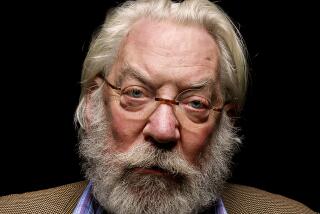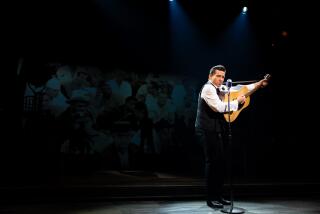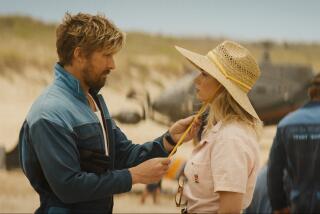Review: The Coen brothers’ ‘The Ballad of Buster Scruggs’ is a small-plate feast, some delicious, others not
The Coen brothers’ new epic, “The Ballad of Buster Scruggs,” is an anthology film, a collection of short segments combined under a framing device to make a feature-length whole.
Sometimes called omnibus films, these efforts often feature, as in 1945’s classic “Dead of Night,” a variety of directors. “Buster” does things differently.
Brothers Joel and Ethan Coen wrote and directed all six segments, so this film plays like a dinner eaten at a small plates restaurant. Inevitably, some of the dishes are going to be tastier than others, lingering in the memory after the lesser ones fade.
With credits like “True Grit” and “No Country for Old Men,” the Coens are clearly serious western fans and apparently have been accumulating these stories for years. Previous plans to turn them in a limited series for TV were discarded for the current form.
Always sticklers for details, the Coens have come up with a deft framing device, creating a fictional antiquarian book, “The Ballad of Buster Scruggs and Other Tales of the American Frontier.” They’ve even supplied tissue-paper leaves protecting the N.C. Wyeth-type illustrations that are revealed as the pages are carefully turned. And they’ve cast a great number of strong and sometimes unexpected actors, including Tyne Daly, James Franco, Brendan Gleeson, Zoe Kazan, Liam Neeson and Tim Blake Nelson.
All the stories deal with life and (especially) violent death in the mythic Old West, which the movies have been immortalizing for more than a century. The idea was to use the Coens’ trademark bleak sense of humor and hopeless attitude to both put their characters in ungodly predicaments and leave the genre as a whole twisting slowly in the wind.
Yes, no end of familiar western situations find their place. Bank robberies, lynch mobs, loyal sidekicks, cattle drives, Indian attacks, soiled doves, shabby saloons, gunfights on main streets, they’re all here. There’s even a sly reference to “aces and eights,” poker-playing Wild Bill Hickok’s famous dead man’s hand.
But if all of this is present, none of it is treated in a familiar, straight-ahead manner. Using their great ability with comic dialogue (the film won the best screenplay award at Venice), the Coens exaggerate and subvert familiar western tropes to gleeful comic effect.
The best example of this, and one of “Buster Scrugg’s” best segments, is the film’s first, starring a hugely entertaining Nelson (a veteran of the Coens’ “O Brother, Where Art Thou”) as the title character.
Dressed entirely in immaculate white, including a hat with an enormous brim, Buster Scruggs is the ultimate singing cowboy, moseying into the Monument Valley frame singing the classic “Cool Water” (a hit for Gene Autry, among others) and talking to the camera as if he didn’t have a care in the world.
But don’t let appearances fool you. One of Buster’s nicknames may be the “San Saba Songbird,” but he is also known as “The West Texas Twit,” not to mention being called out as “The Misanthrope” on a wanted poster the singer angrily rips apart.
For far from being a ray of sunshine, Buster turns out to be the singing cowboy from hell, and hearing him talk and seeing where he ends up is very much a treat.
Fine acting also plays a part in two of the other segments. “Near Algodones” has Franco as a would-be bank robber, and “The Gal Who Got Rattled” features Kazan and Bill Heck, both excellent, as would-be wagon train sweethearts.
The film’s middle sections, as it turns out, compel the least. These include “All Gold Canyon,” with Tom Waits as a cantankerous prospector, and “Meal Ticket,” starring Neeson as a frontier impresario touring with a CG-created armless and legless performer known as “The Wingless Thrush” (Harry Melling). In case you forgot this was the Coen brothers you were dealing with.
The film recovers its footing with its final episode, as good as “Buster Scruggs,” though in a totally different way. It’s “The Mortal Remains,” which references John Ford’s classic “Stagecoach” yarn with a definite “Twilight Zone” twist.
The story is set almost entirely in a bustling coach with five passengers, three of whom — played by Daly, Chelcie Ross and Saul Rubinek — deliver rip-roaring monologues on the nature of human existence.
The other two, played by Gleeson (who does a moving a cappella version of the traditional ballad “The Unfortunate Lad”) and Jonjo O’Neill, claim to be bounty hunters, but something about their line of patter gives one pause.
“We must each play out our own hand,” someone on the coach says, and, win, lose and draw, the Coens play theirs out, as always, in a style unmistakably their own.
‘The Ballad of Buster Scruggs’
MPAA rating: R, for some strong violence
Running time: 2 hours, 12 minutes
Playing: Landmark, West Los Angeles
The film will be available on Netflix on Nov. 16.
More to Read
Only good movies
Get the Indie Focus newsletter, Mark Olsen's weekly guide to the world of cinema.
You may occasionally receive promotional content from the Los Angeles Times.










